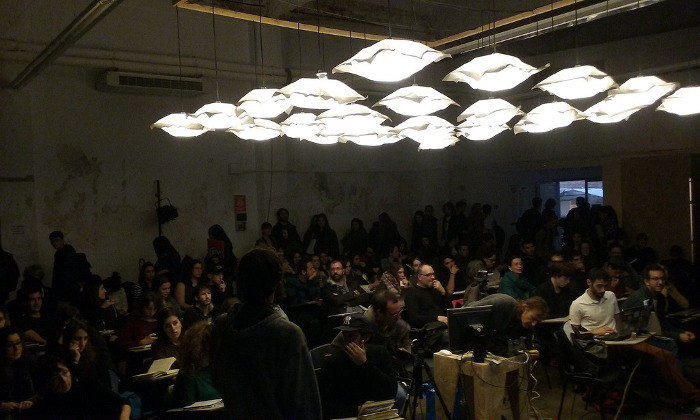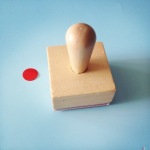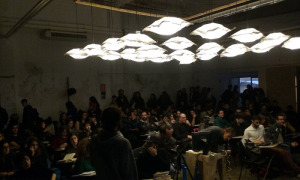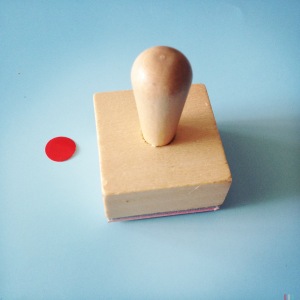FCFORUM MAKERS 2016 – CHIC
PLACE
Barcelona
Bau – Carrer de Pujades, 118, 08005 (map)
SCHEDULE
Public session: 20/10/2016 from 16h till 19h
Closed door workshop (partners and students BAU): 18-19/10/2016 from 9:30h to 19h & 20/10/2016 from 9:30h to 13:30h
CHIC is a project to create bridges between the fields of design, applied arts, digital, popular education and social and solidarity economy.
The project aims to develop Open Source Design prototype around stamps / 3D object, prototyping of a digital press.
The project brings together seven organizations in Europe (France, Italy, Spain, Belgium, and Latvia), around different areas (Design, free culture, fair economy, education, Digital …) to explore new design production skills and new economic conditions through collaborative and open approach through digital technologies.
The event in Barcelona will include 2 days of workshops (closed doors) and a public session to present the work of the different partners.
Participants
Establishment Public Territorial Plaine Commune is located north of Paris (France), it includes 9 cities and approximately 408 000 inhabitants. Identified as “Territory of culture and creation” within the metropolitan area of greater Paris. Culture and creativity are now the Red wire of the development of the territory, Plaine Commune is naturally part of the approach of the CHIC project. He assumes the role of leader in this project and is committed to co-host with the Minga association the European partnership. It will ensure the smooth running of the project and the compliance of the programme particularly in terms of communication and assessment and organize the transnational seminar of launch and return. His experience in economic modeling of third places will be necessary.
The city of architecture and heritage architecture based in Paris (France) brings together a national museum, a school, and the French Institute of Architecture. It will help with the partners to develop the specifications of design workshops. It will organize a workshop at the Pointcarré fablab in Saint-Denis and will participate in workspaces for monitoring and data transfer, the creation of a web platform and will share the results with the general public. Particular attention will be on the quality of dissemination of the results to audiences little sensitized through the preparation of the seminar’s end, the link on the website of the city and a new approach to the non-public in the territories.
The Minga association is an interprofessional federation located in Seine Saint-Denis (France) opening thoughts, discussions and actions where to weave bonds of interprofessional and civic solidarity around a common commitment: working together for a fair economy. It will contribute in collaboration with other partners in the overall management of the project and specifically to the design of the specifications, the implementation of activities by a role of Eve and co-coordinating with each partner in each country. It will ensure the Organization of events at the local level in connection with french partners, the drafting of content on economic development, the conduct of participatory assessment and contribute to the dissemination of the digital prototype.
The openFab is an associative fablab located in Brussels (Belgium) that will develop the digital press reproducing graphic documents in different media (paper, textile, plexi…). It will ensure the operation on the technical, organizational, map the transmission of the methodology and the knowledge acquired on the European territory and beyond.
The children’s Museum EXPLORA is a social cooperative located in Rome (Italy), which develops methods of active pedagogy sensitizing young people and their families in environmental, technological, supply issues… It will organize a workshop of buffers and a giant test with the public. Its team will contribute through its network of partners in education and design to produce a documentation practice and adapted to the general public for the prototype Design.
The community of Liepaja ‘Department culture’ (Latvia) develops with the State, local government and other social partners, the extensive cooperation between the cultural sector and other sectors of the economy in order to create a cultural diversity and progress of cultural economy for sustainable growth. He founded in 2014 the Cluster of the cultural industry to solve problems of the cultural economy. It is an open platform for cooperation and exchange of knowledge of the entrepreneurs in the creation and individual professionals.
Workshops Framework
In practicing the diverse possibilities of the Design Open source (throught Making with numeric technologies, open production & diffusion), CHIC questions a process of a design creation that provides for the complexity of a common real life, in an european society in tension and mutation.
The creation of stamps/traces is the support of this project, there where are working invention, cooperation, ethik of sharing in our multitudes, singularities, crafts in a time when the european history speeds up. The power of the social transformations generates an intensification of individual and collective precarious situations, moving from economic crisis to democratic crisis.
Should we accommodate in between the weight of this reality and the temptation to take refuge in the entertainment and the gratuitous innovation without object, we experiment some ways of making design -peer to peer – that invents a sense of possible in a chaotic situation. Drived initialy by a muddled enthousiasm (like all process that does’nt cheat by cleverness), we suggest that the stamp doesn’t be watching like a reference tool from artisnal and décorative technicals from the local identities and european heritage. It’s also an object of certification delivered by an independant or state organisation. It vouches for conformity – of product, service, information of individual statute – with standards and current regulations, presents or desirables for future. The stamp is an object inherently ambivalent and it’s precisly this ambivalent dimension that must irigate all the work of the workshops.

Throught Themes, the participants (partners, designers, artists, makers, hackers, publics…) will be working -in peer tot peer relation – to produce free prototypes of stamps (2D/3D) and a numeric print machine. It will be shaped in continous collision of borders between standards/ nonstandards, rule/exception, Autority/minority, conviction/responsability, autor/user… The choice of themes in each territory are rubs us concretly with issues of society, that are beyound us and concerns us all. The results of this design Open source will be a translation of this rubbing , of « what connects us to the world and others » as commons that exist, hybridize, transform, pollinate…
It’s by concrete productions that CHIC will become a lever to create cooperations with all kinds of people who wish to invest in the field of local democratic design at European level and to mobilize other on social issues .
Printed Bodies
CHIC workshop – FCForum in collaboration with @BAU
Technology embodiment, body making and digital handiworks
Bodypainting and tattoos are probably the first aesthetic action of human being. They gathered practical functions, like camouflage or protection with the needs of culture identification of different social groups, marking the different stages though live of a person or defining social roles and status of individuals within a group. The representation, modification, alteration of bodies is one of our first technologies and the traditional patterns used one of the first examples of design.
Our bodies are in a way designed, as they are a social construct. We need our bodies to be alive but also for “being”. And their limits are not only restricted to the natural substance. Politics, ethics and technologies are as much as important as DNA chains to define them, to define us. In the digital or posthuman era, the relation with our bodies is even more fundamental in the creation of subjectivity, in the process of differentiation and identification with the others and in the definition of cultural identities. In a way, they are the battlegrounds of the “BioPower”.
All the problems and big challenges we have as society can be crossed by this embodiment vision. From anorexia & bulimia to the right to expose or cover your body in public spaces and their representation in media, from to the right of expanding our physical limits with implants and limits of bioethics we are constantly dealing with our “wetware”. Gender is a technology and we are cyborgs in a war that is taken place around our physical boundaries. Can we design and print images, patterns or even design new skins for these bodies? How does affect and transform us physically things as patriarchy, colonialism, racism, intolerance, exclusion, difference or multiculturalism? What´s the role of design and designers in this scenario?
The body and embodiment will be also very important for the methodologies used during the workshop. Our body is a way to experience reality. We can understand a concept, but the way an artisan works is asking his hands what to do. One of the most important thing about maker movement is not related with technology but also with recovering hand practises, dialog with materials and tacit knowledge. These are very important skills for today designers. The use of embodiment, of Making , by means of drawing, modelling or whatever act of making that implies skills constitutes the designerly way to reflect and research.
As designers we deal with reality and complexity and we use our skills to transform the world they live in. But we are constantly asked to translate sensitivity using language and rationally structured thinking, so our our expressivity is constantly constrained. We tend to face reality it in a modernistic and Cartesian way by simplifying. The result is an engineering way of thinking that is not conected with reality. Complexity is better handled by trusting intuition, playing with the elements of resistance and accepting to float in ambiguity. Our culture does not provide the skills to do it this way but digital handcraft and the use of embodiment (known with your body) could do it. We will develop methodologies to achieve this way of research, combining high technology with pre-industrial methods trying to imagine how the XXII designers skills will be look like.
In the workshop the participants will be working -in small groups and peer to peer relation – to to research through design on contemporary prototypes of body stamps, stamps of bodies, stamped bodies and everything in between and around. We will use 2D and 3D assisted technologies, hand tools and our hands as a tool, craftsman techniques, maker ethics and digital processes trying to find « what connects us to the world and others ». The use of our bodies, technology embodiment and cultural representations has the aim of empowering ethics, and cultural hibridation through design, using digital and nondigital technologies as materials.
Concrete productions that CHIC workshops will become a lever to create cooperations with all kinds of people who wish to invest in the field of local democratic design at European level and to mobilize other on social issues .
This workshop is oriented to: Designers, makers, builders, craftswomen, dancers, performers and IT people that want to shape societal transformation and are interested in transdisciplinary design conversations and works.
Hosts: Xnet and BAU
FCFORUM MAKERS 2016 – CHIC
LLOC
Barcelona Bau – Carrer de Pujades, 118, 08005 (map)
PROGRAMA
Sessió pública: 20/10/2016 a partir de les 16h fins a les 19h Sessió taller a porta tancada (socis i estudiants BAU): 18-19/10/2016, de les 9: 30h a les 19h i 20/10/2016 de les 9: 30h a les13: 30h
 CHIC és un projecte per crear ponts entre els camps del disseny, arts aplicades, plataforma digital, l’educació popular i l’economia social i solidària.
CHIC és un projecte per crear ponts entre els camps del disseny, arts aplicades, plataforma digital, l’educació popular i l’economia social i solidària.
El projecte té com a objectiu desenvolupar prototips de disseny Open Source com segells / objectes 3D, creació d’un prototip d’una premsa digital.
El projecte reuneix set organitzacions a Europa (França, Itàlia, Espanya, Bèlgica i Letònia), al voltant de diferents àrees (disseny, cultura lliure, economia justa, educació, digital …) per explorar noves tècniques de producció de disseny i les noves condicions econòmiques a través de col·laboració i l’enfocament obert a través de les tecnologies digitals.
L’esdeveniment a Barcelona inclourà 2 dies de tallers (porta tancada) i una sessió pública per presentar el treball dels diferents socis.
Participants
Establishment Public Territorial Plaine Commune es troba al nord de París (França), que inclou 9 ciutats i aproximadament 408.000 habitants. Identificat com “Territori de la cultura i la creació” dins de l’àrea metropolitana del Gran París. La cultura i la creativitat són prioritat pel desenvolupament del territori, Plaine Commune és naturalment part de l’enfocament del projecte CHIC. Assumeix el paper de líder en aquest projecte i s’ha compromès a ser co-amfitrió amb l’Associació europea Minga. Amb això es garantirà el bon funcionament del projecte i el compliment del programa, especialment en termes de comunicació i avaluació.
The city of architecture and heritage architecture amb seu a París (França) reuneix un museu nacional, una escola, i l’Institut Francès d’Arquitectura. Junt amb els socis serà clau per desenvolupar les especificacions de tallers de disseny. S’organitzarà un taller al FabLab Pointcarré a Saint-Denis i participarà en les àrees de treball per al seguiment i la transferència de dades, la creació d’una plataforma web i compartirà els resultats amb el públic en general. Posarà especial atenció a la qualitat de la disseminació dels resultats a un públic poc sensibilitzat a través de la preparació final del seminari amb l’enllaç a la pàgina web de la ciutat i un nou enfocament en els territoris.
The Minga association és una federació interprofessional situada a Seine Saint-Denis (França). Opening thoughts, discussions i accions on teixir llaços de solidaritat interprofessional i ciutadana al voltant d’un compromís comú: treballar junts per una economia justa. Així mateix, contribuirà en col·laboració amb altres entitats en la gestió global del projecte i específicament per al disseny de les especificacions. Amb això es garantirà l’organització d’esdeveniments a nivell local en relació amb els socis francesos, l’elaboració dels continguts en el desenvolupament econòmic, la realització de l’avaluació participativa i contribuir a la difusió del prototip digital.
The openFab és un FabLab associatiu amb seu a Brussel·les (Bèlgica), que desenvoluparà la premsa digital de reproducció de documents gràfics en diferents mitjans (paper, tèxtil, Plexi …). Amb això es garantirà l’operació en la tècnica, un mapa de la transmissió de la metodologia i els coneixements adquirits en el territori europeu i més enllà.
The children’s Museum EXPLORA és una cooperativa social situada a Roma (Itàlia), que desenvolupa mètodes de pedagogia activa per sensibilitzar els joves i les seves famílies en temes ambientals, tecnològics, de subministrament … S’organitzarà un taller de tampons i un test gegant amb el públic. El seu equip contribuirà a través de la seva xarxa de socis en l’educació i el disseny per produir una documentació pràctica i adaptada al públic en general per al disseny del prototip.
The community of Liepaja ‘Department culture’ (Latvia) desenvolupa amb l’Estat, els governs locals i altres agents socials, l’àmplia cooperació entre el sector cultural i altres sectors de l’economia amb la finalitat de crear una diversitat cultural i el progrés de l’economia de la cultura per al creixement sostenible. Va fundar en 2014 el Clúster de la indústria cultural per a resoldre els problemes de l’economia cultural. És una plataforma oberta per a la cooperació i l’intercanvi de coneixement dels empresaris en la creació i professionals individuals.
Workshops Framework
En la pràctica de les diverses possibilitats de Design Open source, CHIC realitza un procés de creació del disseny que preveu la complexitat d’una vida real comú, en la societat europea de la tensió i la mutació . La creació de segells / rastres és el suport d’aquest projecte, allà on estan treballant la invenció, la cooperació, l’artesania en un moment en què la història europea s’accelera. El poder de les transformacions socials genera una intensificació de les situacions precàries individuals i col·lectives, passant de la crisi econòmica a la crisi democràtica. Hem de acomodar el pes d’aquesta realitat i la temptació de refugiar-se en l’entreteniment i la innovació gratuïta i sense objecte, experimentem algunes formes de fer el disseny -peer to peer – que inventa un sentit possible en una situació caòtica. Derivat inicialment per un entusiasme confús, sugerim que el segell no es vegi com una eina de referència de vehicles tècnics artesanals i decoratius de les identitats locals i el patrimoni europeu. És també un objecte de la certificació lliurada per una organització independent o estat. Es dóna fe de la conformitat – de producte, servei, informació d’estatuts individuals – amb les normes i reglaments actuals, presents o desitjables per al futur.El segell és un objecte intrínsecament ambivalent i que és precisament aquesta dimensió ambivalent la que haurà de ser originaria de tot el treball dels tallers.a la feina dels workshops.

fcforum-makers-2015-bau
Throught Themes, els participants (socis, dissenyadors, artistes, creadors, hackers, el públic …) estaran treballant – en una relació peer to peer – per produir prototips gratuïts de segells (2D / 3D) i una màquina d’impressió numèrica. Es formarà en col·lisió contínua de les fronteres entre standards/ nonstandards, regle / excepció, autority / minoria, la convicció / responsabilitat, autor / usuari … nosaltres. L’elecció dels temes de cada territori ens condueix concretament amb les qüestions de la societat, que estan més enllà de nosaltres i ens concerneix a tots. Els resultats d’aquest disseny de codi obert serà una traducció d’aquest frec, de «el que ens connecta amb el món i els altres» com un bé comú que existeixen, s’hibriden, transforman, pol·linitzen … És per produccions concretes que CHIC es converteix en una palanca per a crear cooperacions amb tot tipus de persones que vulguin invertir en el camp del disseny local a nivell europeu i per mobilitzar altres en assumptes socials.
Printed Bodies
CHIC workshop – FCForum in collaboration with @BAU
Technology embodiment, body making and digital handiworks
Bodypainting i els tatuatges són probablement la primera acció estètica de l’ésser humà. Es van reunir les funcions pràctiques, com el camuflatge o la protecció de les necessitats de la cultura d’identificació dels diferents grups socials, marcant les diferents etapes o la definició dels rols socials i l’estat dels individus dins d’un grup. La representació, modificació, alteració dels cossos és una de les nostres primeres tecnologies i els patrons tradicionals que s’utilitzen un dels primers exemples de disseny.
Els nostres cossos estan d’alguna forma dissenyats, ja que són una construcció social. Necessitem que els nostres cossos estiguin vius, però també per “ser”. I els seus límits no es limiten només a la substància natural. Política, ètica i les tecnologies són tan importants com les cadenes d’ADN per definir-nos. En l’era digital o post-humana, la relació amb el nostre cos és encara més fonamental en la creació de la subjectivitat, en el procés de diferenciació i identificació amb els altres i en la definició de les identitats culturals. En certa manera, són els camps de batalla del “biopoder”.
Tots els problemes i grans reptes que tenim com a societat poden ser travessats per aquesta manera de modalitat de visió. Partint de l’anorèxia i la bulímia cap a exposar o cobrir el cos en l’espai públic i la seva representació en els mitjans de comunicació, ampliar els nostres límits físics amb els implants i els límits de la bioètica, constantment estem tractant amb la nostra “wetware”. El gènere és una tecnologia i som cyborgs en una guerra que es pren lloc al voltant dels nostres límits físics. Podem dissenyar i imprimir imatges, patrons o fins i tot dissenyar nous skins per aquests cossos? Com afecta físicament transformar-nos en coses com el patriarcat, el colonialisme, el racisme, la intolerància, l’exclusió, la diferència o el multiculturalisme? Com el paper del disseny i els dissenyadors en aquest escenari?
El cos i la manera de realització seran també molt importants per a les metodologies utilitzades durant el taller. El nostre cos és una forma d’experimentar la realitat. Podem entendre un concepte, però la forma en què funciona un artesà està demanant a les seves mans el que cal fer. Una de les coses més importants sobre el moviment de mapes no està relacionada amb la tecnologia, sinó també amb la recuperació de les pràctiques de la mà, de diàleg amb els materials i el coneixement tàcit. Aquestes són habilitats molt importants per als dissenyadors d’avui dia. L’ús de la realització, de la presa, per mitjà del dibuix, el modelatge o qualsevol acte de fer això implica habilitats constitueix la forma designerly per reflectir i investigació.
Com a dissenyadors ens ocupem de la realitat i la complexitat i fem servir les nostres habilitats per transformar el món en què vivim. Però se’ns demana constantment per traduir la sensibilitat utilitzant un llenguatge estructurat i racional de pensar, pel que la nostra la nostra expressivitat està limitat constantment. Tenim la tendència a enfrontar-se a la realitat d’una forma modernista mitjançant la simplificació. El resultat és una forma d’enginyeria de pensar que no es conecta amb la realitat. La complexitat es maneja millor per confiar en la intuïció, jugant amb els elements de resistència i acceptar a surar en l’ambigüitat. La nostra cultura no proporciona les habilitats per fer-ho d’aquesta manera, però l’artesania digital i l’ús de la realització podria fer-ho. Anem a desenvolupar metodologies per assolir aquesta forma de recerca, que combina l’alta tecnologia amb mètodes preindustrials tractant d’imaginar els dissenyadors del segle XXII.
Al taller, els participants estaran treballant -en petits grups i d’igual a igual relació – per la recerca a través del disseny de prototips contemporànies de segells, segells del cos dels òrgans, organismes estampats i tot en el medi i al voltant. Utilitzarem les tecnologies 2D i 3D assistida, eines de mà i les nostres mans com una eina, tècniques artesanes, fabricant ètica i els processos digitals tractant de trobar «el que ens connecta amb el món i els altres». L’ús dels nostres cossos, realització, la tecnologia i les representacions culturals ténen l’objectiu de potenciar l’ètica, i hibridació cultural a través del disseny, l’ús de les tecnologies digitals i no digitals com materials.
Produccions concretes que en els tallers CHIC es convertiran en una palanca per crear cooperacions amb tot tipus de persones que vulguin invertir en el camp del disseny democràtic local a nivell europeu i per mobilitzar altres en assumptes socials.
Aquest taller està orientat a: dissenyadors, fabricants, constructors, artesans, ballarins, artistes i gent de IT que volen donar forma a la transformació social i estan interessats en converses transdisciplinàries disseny i obres.
Organitzat per: Xnet i BAU










